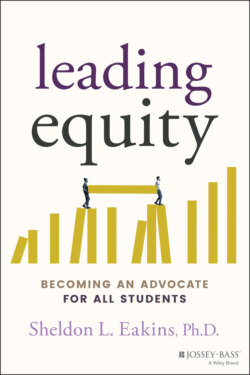Читать книгу Leading Equity - Sheldon L. Eakins - Страница 11
Becoming a Disruptor
ОглавлениеYears ago, I lived in Oregon, and I joined the NAACP because I wanted to join a national organization. I figured I wanted to be a part of the movement. I have absolutely nothing against the NAACP, but my experience in this national organization made me really think, Is there more that I could do if I'm not affiliated with a group or an organization? I signed up to be a member and started attending the meetings. We would talk about various initiatives that we were working on. One meeting, I looked at the chapter president, thinking, He seems a little frustrated. It seemed like sometimes he was hitting walls. He would say, “Okay, I just met with this individual” or “I met with this organization” or “I met with the city's this or that, but it still didn't produce the outcomes that we were hoping for.” Sometimes, it seemed like the doors would get closed in our faces.
We were advocating, organizing, and talking about different initiatives that we would love to see changed. A lot of the stuff was simple stuff. It wasn't even a big deal like passing new laws or mandates. Some of it was just simple strategies such as getting some new books at a school that could utilize books but didn't have the funding. (Crickets.) Some of it wasn't the biggest ask if that makes sense. You may not be aware that this is happening, but it seemed like sometimes (a lot of times rather) folks just didn't want to hear what we had to say. I believe the defense mechanisms for many folks in positions of power would be triggered when we would approach them with our concerns. Could it have been because we were affiliated with a national organization dedicated to civil rights and equality?
During my time as a member of the NAACP, a white supremacist named Dylann Roof went into a church and killed Clementa C. Pinckney, Cynthia Graham Hurd, Susie Jackson, Ethel Lee Lance, Depayne Middleton-Doctor, Tywanza Sanders, Daniel L. Simmons, Sharonda Coleman-Singleton, and Myra Thompson. Nine innocent church members were worshipping. All of the sudden, our phones started ringing off the hook. “Can the NAACP come speak? Can you participate in this vigil? Can you do this? Can you do that?” I started thinking, Man where were you before this? It seemed like sometimes we were hitting walls, and then suddenly, tragedy happened, and people wanted to listen. They said, “Now, we want to hear what you have to say, but we want to hear what you have to say regarding this recent tragedy.” I hate that it takes tragedy sometimes for folks to want to listen. Even when they want to listen, often they want to listen to only what they want to hear. They say, “Just make your statement about what happened. We don't have a statement of our own, so we will just use what you say and second it.”
There's that level of comfort. I get it. Conversations at any level regarding race may be difficult for some of us. Again, I appreciate my time as a member of the NAACP; I just started to think that I might be able to do more as an individual versus my affiliation with a recognized entity. Sometimes, when people see those national organizations and people know what they represent, some folks automatically will start to get defensive, or they automatically think or assume that you have an agenda because you're with that group as opposed to me being Sheldon and advocating as a member of the community.
When you look at the definitions of ally and disruptor, according to Merriam-Webster, the definition for ally is “to join yourself with another person, group, et cetera, in order to get or give support.” See, nowhere does it say anything about actionable steps in that definition. I can get or give support, but how does that look? I prefer the term disruptor. You might hear people say co-conspirator, and I think advocacy and activism can be put in there as well. However, I like the term disruptor, because the definition of a disruptor is “to break apart; to interrupt the normal course or unity of; to break apart.” An advocate is a person who recognizes that we do live in an unjust society. Advocates are not satisfied with the status quo, and they're willing to speak up on behalf of others.
My final question to you is, “What are you?”
